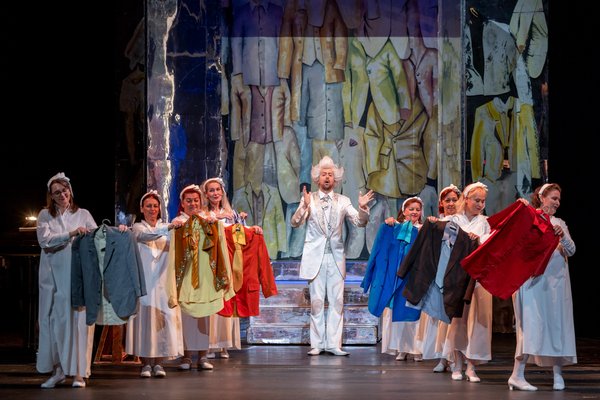The marketplace is buzzing with hustle and bustle. Dani and Béni loudly proclaim that the weaver's craft is the most useful of all trades, especially if somebody knows how to weave cloth as wondrous as theirs is. At this point, the patrolling guardsmen come over, and when the captain learns that the two strangers from far away are offering miraculous fabrics for sale, they immediately take them to the king. Because His Serene Highness King Pomade has a problem. The next day he will be celebrating his name day, the day each year when he marches in a glorious procession before his beloved people. This time, however, it looks like the eagerly awaited ceremony will have to be cancelled, because the king does not have a single item of clothing that he hasn't worn at least once before. Even though he has lots and lots of clothes, the king is bored with all of them, and the tailors have run out of ideas.
After the great monarch has polished off his ample breakfast, the two miracle weavers are brought before him. To great joy, the king rescinds his previous command to call of the next day's parade. Now he'll have something to wear after all, and won't have to spend his name day in bed! Dani and Béni promise to weave the wondrous fabric out of their miracle thread, and to sew him a wondrous suit out of it. However, they also mention one more thing: the clothing has an important feature. Only people who are intelligent, honest and just can see it. Those who lie or are wicked or stupid will see nothing but thin air.
The king is tormented by nightmares all night. What will happen if he can't see this miraculous clothing of theirs? He quickly sends out his chancellor and ministers to take a peek at the weavers' work. If they can see the cloth, then he certainly will too, since a king cannot be stupider than his subordinates, and “God gives brains to those he puts in office.” Meanwhile, Dani and Béni are industriously sewing away at nothing. Of course neither the chancellor nor the ministers see anything, but none of them dare admit it.
In the morning, the king himself shows up. At first he is too astonished to speak, but the weavers exalt their own work so highly that finally he is persuaded to march behind the folding screen and try it on. The clothing fits his fine figure so well, he almost feels that he isn't wearing any clothes at all.
At last, it's time for the great event. The procession marches through the marketplace, and out from the grand baldachin emerges the king, completely naked. In the frozen silence, a single voice belonging to a little apprentice shoemaker calls out shrilly: “the king isn't wearing any clothes!” Then all hell breaks loose. A storm of onions and tomatoes rain down on the king and his court. The grandees flee, racing off in all directions.

